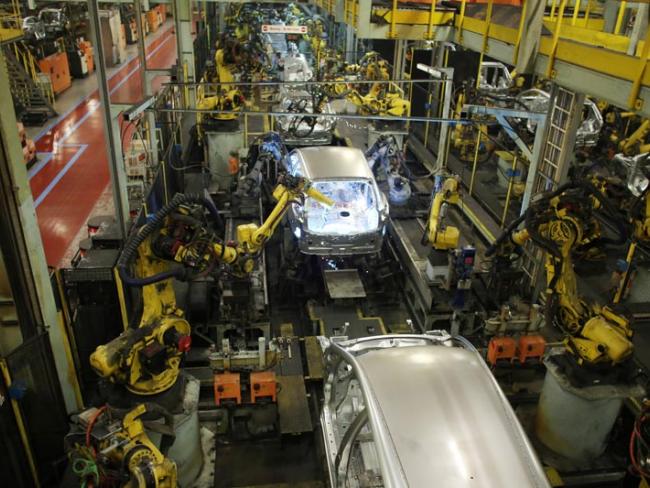31 October 2016

Nissan’s Sunderland plant. Photo Nissan UK.
During the referendum campaign the Remain side could not come up with any concrete benefits of staying in the Union, so it fell back on Project Fear, predicting dire economic consequences of a vote to leave.
Now they have lost Remainers still can’t think of any reason to stay or positive benefits to keep from our membership, so they continue the campaign by other means, again drawing on their one weapon, fear.
These enemies of independence now comb through the financial news looking for any hint that armageddon is on the horizon for Britain’s manufacturing industry. They have become the chief denigrators of Britain, running down anything and everything in an attempt to show they were right.
Benefits
But manufacturing is doing rather well. Although big business does not like a disruption in its cozy relationship with the EU, some, such as JCB and Dyson, could see the benefits of leaving before the referendum and have seen no cause to change their mind. Other big businesses have done what they always do and used the situation to further their own ends.
Nissan has form on this. In the year 2000 Tony Blair had himself to intervene to respond to Nissan’s threats to move abroad due to the uncompetitive high value of the pound, which made their British cars too expensive abroad. That intervention must have worked as they continued to produce here.
‘Despite its crocodile tears Nissan is still here.’
Three years later it campaigned for Britain to join the euro, without which according to Nissan, it would have to move to France. Yet despite its crocodile tears Nissan is still here, and its latest threat to pull out of Britain has within weeks turned into a huge investment in not one, but two new cars.
French ownership
It was always an empty threat (made, note, by a company 43.4 per cent owned by French company Renault, itself around 20 per cent owned by the French government) . In Sunderland Nissan have one of the most productive car factories in the world, and due to sterling’s effective devaluation since 23 June have an estimated 15 to 20 per cent cut in their labour costs.
Toyota has also said it intends to keep producing here. Ford UK, which employs 14,000 workers here, has announced a £100m investment in their engine plant at Bridgend. The weaker pound has given steel making in Britain a reprieve and has even slashed its pension liabilities.
Competitiveness
With any major change there are upsides and downsides. John Elliot, founder of EBAC, the Northern white goods manufacturer, which has just launched the first washing machine to be produced in Britain for 10 years, is looking forward to import tariffs to boost competitiveness of his products.
Lord Bamford, head of JCB, which employs 11,000 workers in Britain to turn over around £3 billion a year, sees his business growing more strongly outside the single market and is actively campaigning to leave it.
A month after the vote pharma giant GSK announced a £275 million investment here to make products for export, saying that for it Britain is still a great place to do business. "It is testament to our skilled UK workforce and the country's leading position in life sciences that we are making these investments in advanced manufacturing here,” said its chief executive
Of course it is right. Manufacturing in Britain is held back by EU membership and has a great future when we leave.
Big companies tried to fight to save the status quo but have rapidly recognised the inevitability of Brexit . They know the foolishness of broadcasting to employees, shareholders and customers a message that their products will be more expensive and unreliable when Britain leaves the EU.
For business reasons alone their message will move from hostility to grudging acceptance to positivity as we move out. Efficient, high tech manufacturing is here to stay.
